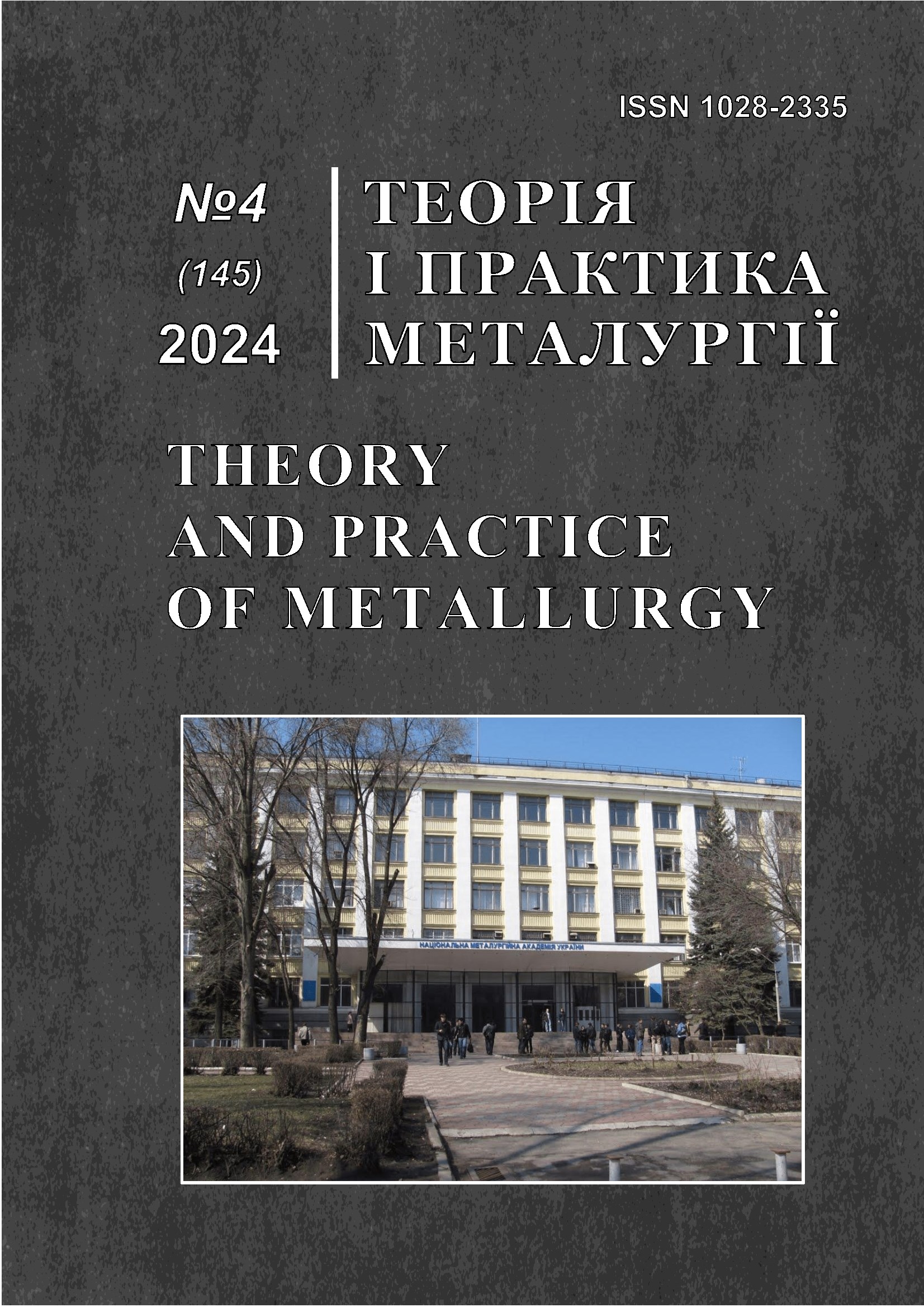Effect of chemical composition on the phase transformation temperature during the hot rolling of profiles with a given level of mechanical properties
DOI:
https://doi.org/10.15802/tpm.4.2024.05Keywords:
heat treatment, intercritical annealing, quenching and tempering, phase transformationsAbstract
This study explores the modeling of structural transformations and the development of optimal microstructures in steels subjected to advanced heat treatment processes. The mathematical description of phase transformations is based on the theory of nucleation and grain growth, with thermokinetic diagrams serving as a foundation for predicting microstructural evolution. Special attention is given to the Quenching-and-Partitioning (Q&P) process, which facilitates the formation of multi-phase microstructures with a balanced ratio of martensite and retained austenite. The research highlights the significance of cooling methods in achieving desired properties. Among these, water-air spray cooling is shown to effectively enhance heat dissipation while adapting to complex component geometries. Experiments demonstrate that Q&P-treated 22MnB5 steel achieves improved strength (Rm = 1045 MPa) and elongation (A = 10.8 %) compared to conventional processes, with lower alloying element content.
References
Hwang, J.-K. (2020). Thermal behavior of a rod during hot shape rolling and its comparison with a plate during flat rolling. Processes, 8(3), 327. https://doi.org/10.3390/pr8030327
Zhong, L. et al. (2021). Hot deformation behavior and dynamic recrystallization of ultra high strength steel. Metals, 11(8), 1239. https://doi.org/10.3390/met11081239
Raabe, D. et al. (2020). Current challenges and opportunities in microstructure-related properties of advanced high-strength steels. Metallurgical and Materials Transactions A., 51(11), 5517–5586. https://doi.org/10.1007/s11661-020-05947-2
Barani, A. A. et al. (2007). Design of high-strength steels by microalloying and thermomechanical treatment. Materials Science and Engineering: A, 463(1-2), 138–146. https://doi.org/10.1016/j.msea.2006.08.124
Li, J. et al. (2023). Progress on improving strength-toughness of ultra-high strength martensitic steels for aerospace applications: A review. Journal of Materials Research and Technology. https://doi.org/10.1016/j.jmrt.2022.12.177
Bach, M. et al. (2020). Conductive heating during press hardening by hot metal gas forming for curved complex part geometries. Metals, 10(8), 1104. https://doi.org/10.3390/met10081104
Palmieri, M. E., Lorusso, V. D., & Tricarico, L. (2020). Investigation of material properties of tailored press hardening parts using numerical and physical simulation. Procedia Manufacturing, 50, 104–109. https://doi.org/10.1016/j.promfg.2020.08.019
Blankart, C., Wesselmecking, S., & Krupp, U. (2021). Influence of quenching and partitioning parameters on phase transformations and mechanical properties of medium manganese steel for press-hardening application. Metals, 11(11), 1879. https://doi.org/10.3390/met11111879
Li, Y. Z. et al. (2022). Enhancing yield stress and uniform elongation in an ultrathin packaging steel via controlling dislocation density. International Journal of Plasticity, 103334. https://doi.org/10.1016/j.ijplas.2022.103334
Hu, Z. et al. (2019). Optimization of metal rolling control using soft computing approaches: A review. Archives of Computational Methods in Engineering. https://doi.org/10.1007/s11831-019-09380-6
Andrews, K. (1965). Empirical formulae for the calculation of some transformation temperatures. J. Iron Steel Inst., 721–727.
Soleimani, M., Kalhor, A., & Mirzadeh, H. (2020). Transformation-induced plasticity (TRIP) in advanced steels: A review. Materials Science and Engineering: A. 795, 140023. https://doi.org/10.1016/j.msea.2020.140023
Prykhodko, I. Y. et al. (2021). Computer system of monitoring the residual resource of equipment of strip mill. Fundamental and applied problems of ferrous metallurgy, 35, 149–158. https://doi.org/10.52150/2522-9117-2021-35-149-158
Golovko, O. et al. (2014). Spray cooling of extruded EN AW-6082 aluminium alloy sheets: spatial heat transfer coefficients. Forschung im Ingenieurwesen, 78(3-4), 131–137. https://doi.org/10.1007/s10010-014-0181-y
Lee, D. L. (1974). Conservation laws, gravitational waves, and mass losses in the Dicke-Brans-Jordan theory of gravity. Physical Review D., 10(8), 2374–2383. https://doi.org/10.1103/physrevd.10.2374
Downloads
Published
How to Cite
Issue
Section
License
Copyright (c) 2024 Korniev S.V., Frolov Ya.V., Bobukh O.S.

This work is licensed under a Creative Commons Attribution 4.0 International License.
Authors retain copyright of the published papers and grant to the publisher the non-exclusive right to publish the article, to be cited as its original publisher in case of reuse, and to distribute it in all forms and media. Articles will be distributed under the Creative Commons Attribution 4.0 International (CC BY 4.0) licence.
Authors can enter the separate, additional contractual arrangements for non-exclusive distribution of the published paper (e.g., post it to an institutional repository or publish it in a book), with an acknowledgement of its initial publication in this journal.




